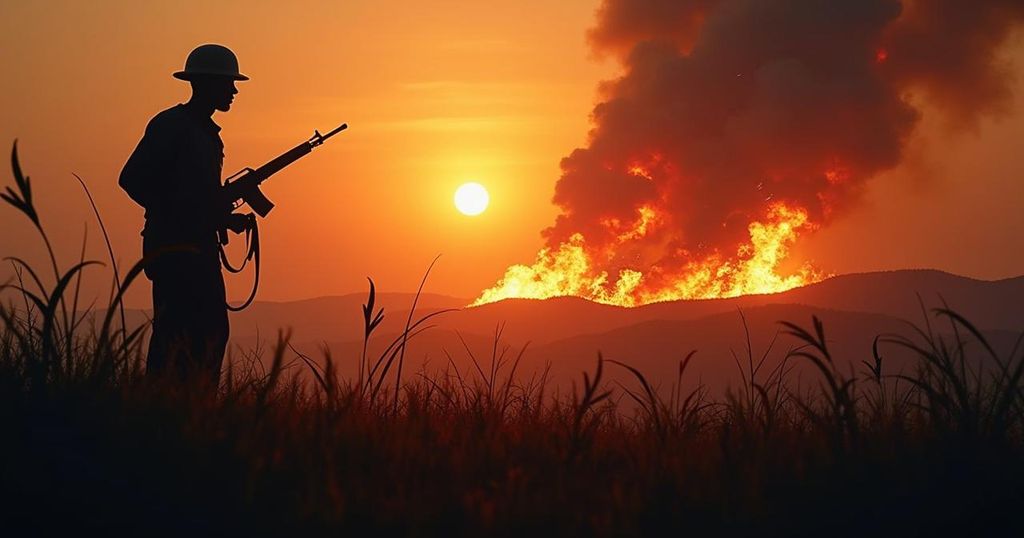The Democratic Republic of the Congo is experiencing a humanitarian crisis affecting over 25 million people due to prolonged conflict, mass displacements, and health emergencies such as Mpox. The crisis has led to overwhelming food insecurity, with millions at risk of malnutrition and disease. Continued violence, particularly from the M23 separatist movement, complicates efforts to manage these urgent needs. There is a call for immediate international support to address the deepening crisis.
The Democratic Republic of the Congo (DRC) is currently grappling with a profound humanitarian crisis, affecting at least 25 million individuals according to the United Nations health agency. The eastern region of the DRC, rich in minerals, has experienced decades of conflict that has resulted in unprecedented violence, mass displacements, and the exacerbation of numerous health issues. Dr. Adelheid Marschang, Senior Emergency Officer at the World Health Organization (WHO), highlighted that the DRC currently has the highest number of individuals requiring humanitarian assistance globally, with 25.4 million people impacted, many experiencing chronic and acute distress. The crisis has led to the displacement of approximately 7.4 million individuals, with 2.8 million residing in North Kivu alone. This increase in displacement is attributed to the renewed offensives from the M23 separatist movement since 2022, generating a national and regional military response that has inadequately curtailed the militia’s progress. The resultant mass displacement has placed immense pressure on already fragile water and sanitation infrastructures, aggravating the dire resources available to the populace. Dr. Marschang reported that about 40 million individuals face serious food shortages, with 15.7 million experiencing severe food insecurity, putting them at heightened risk of malnutrition and infectious diseases. Immediate action is critical, as failure to address these needs may result in more than one million children suffering from acute malnutrition. Furthermore, health crises, including outbreaks of cholera, measles, meningitis, Mpox, and plague, have been reported, intensified by severe flooding and landslides. Mpox, in particular, poses a significant health risk, with the DRC documenting 20,000 cases and over 1,000 deaths in 2023 alone. So far this year, over 11,000 Mpox cases, including 443 fatalities, have been reported, predominantly affecting children. The UN health agency expressed concern that military activities around overcrowded camps in and around Goma hinder effective containment of the virus. Bintou Keita, the Special Representative of the Secretary-General, addressed the UN Security Council, characterizing the DRC as facing one of the most severe and neglected humanitarian crises in contemporary times. The Humanitarian Response Plan for 2024 aims to support 8.7 million individuals and requires $2.6 billion for its implementation, yet currently, only 16 percent of this plan is funded. WHO is advocating for $30 million to manage the situation until year’s end. The security landscape further deteriorated with the withdrawal of the UN Stabilization Mission in DRC (MONUSCO) from South Kivu, which has concluded the first phase of disengagement following a governmental request to close the mission. Bintou Keita emphasized the need for cautious withdrawal due to the risks posed by M23 activities potentially escalating into a wider regional conflict. UN human rights chief Volker Türk warned of the concerning levels of violent insecurity, pointing to a significant absence of State authority enabling vicious violence and attacks across large territories.
The Democratic Republic of the Congo has long battled pervasive violence rooted in its conflict-ridden eastern region, compounded by the country’s vast mineral wealth that has often fueled disputes. This long-standing discord has precipitated a substantial humanitarian crisis, marked by mass displacement and severe health emergencies. Organizations such as the WHO continue to monitor and respond to the crisis, emphasizing the urgent need for international support against worsening conditions exacerbated by the ongoing conflict and health threats such as Mpox.
In summary, the humanitarian situation in the DRC is dire, with millions in urgent need of assistance due to conflicts, displacement, and health crises. The continued escalation of violence, particularly from the M23 separatist movement, alongside the outbreak of infectious diseases such as Mpox, renders the situation increasingly precarious. The global community’s immediate attention and financial support are critical to alleviating this humanitarian disaster and addressing the health emergencies plaguing the region.
Original Source: news.un.org






